Unit 8 It must belong to Carla 知识点详解及练习 (含答案)
文档属性
| 名称 | Unit 8 It must belong to Carla 知识点详解及练习 (含答案) |
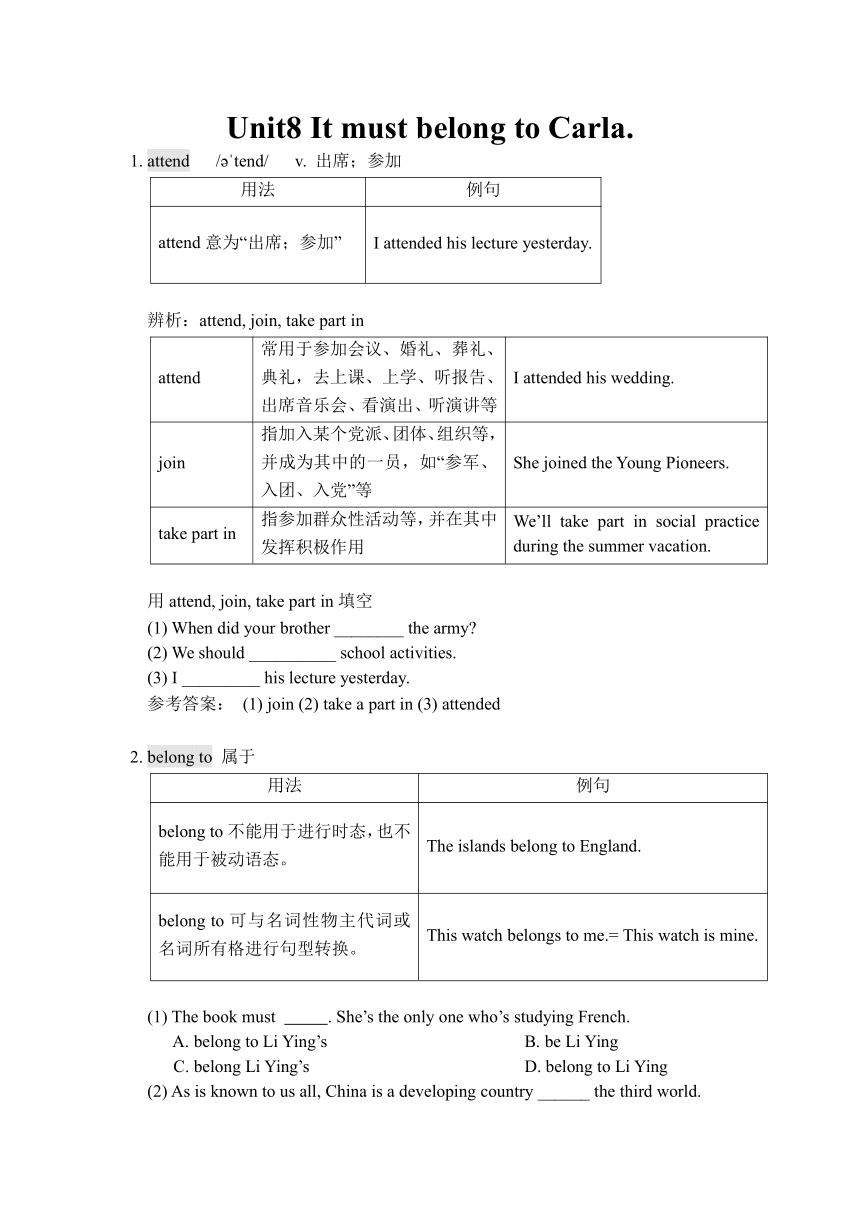
|
|
| 格式 | docx | ||
| 文件大小 | 1.4MB | ||
| 资源类型 | 教案 | ||
| 版本资源 | 人教新目标(Go for it)版 | ||
| 科目 | 英语 | ||
| 更新时间 | 2020-12-18 18:15:25 | ||
图片预览

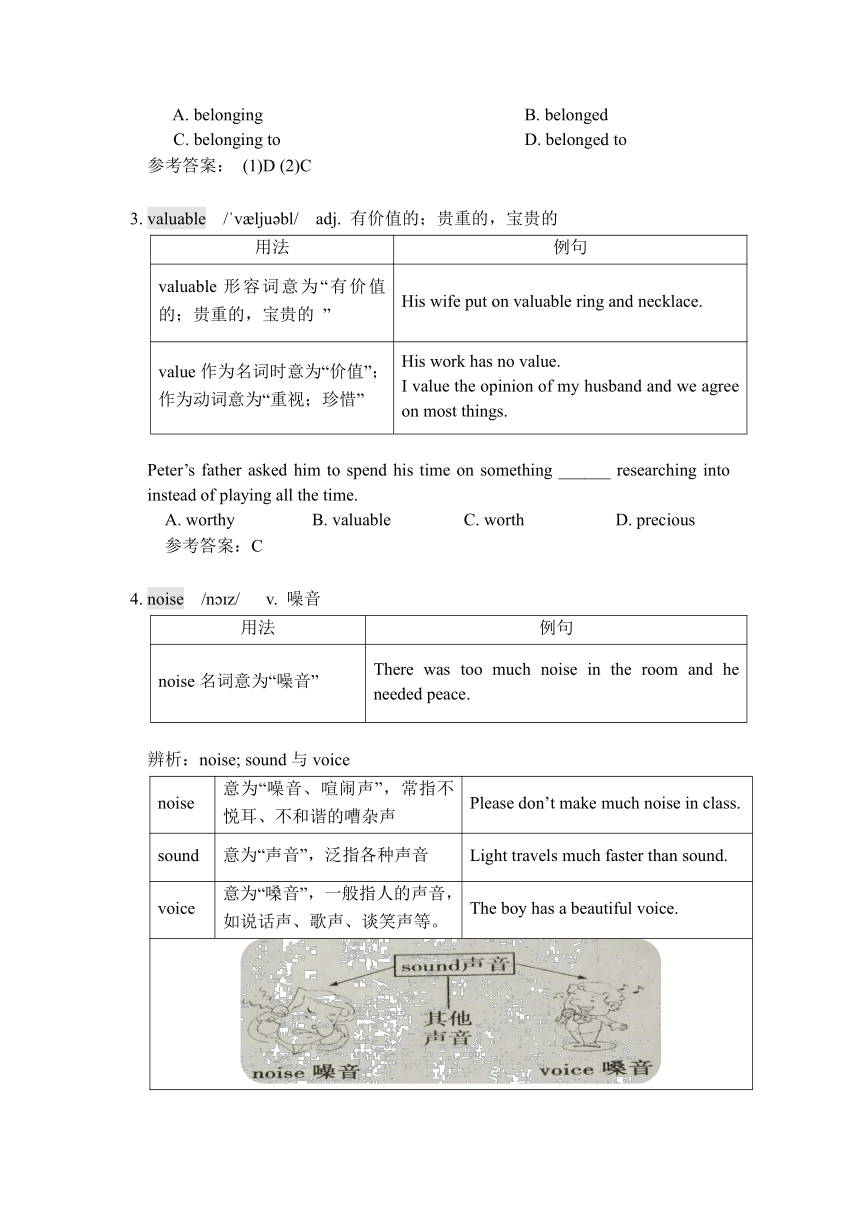
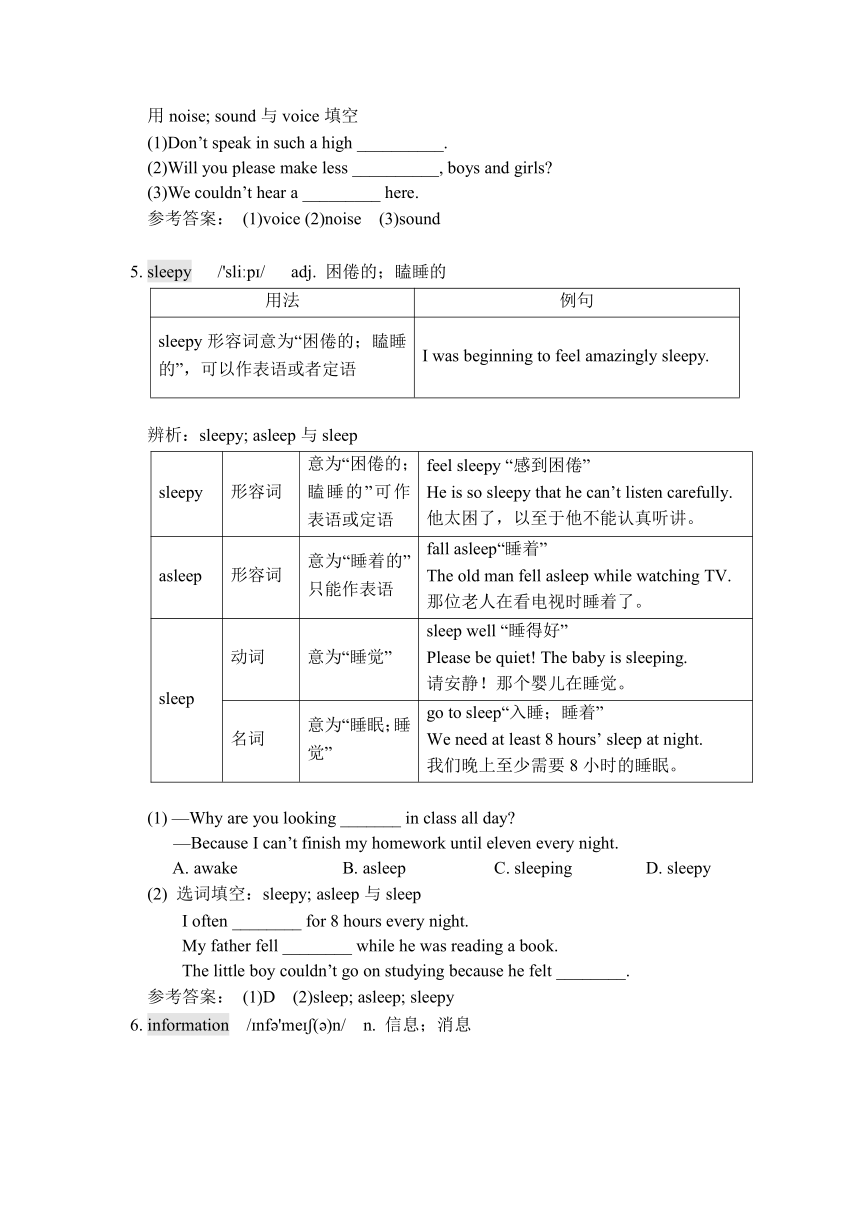
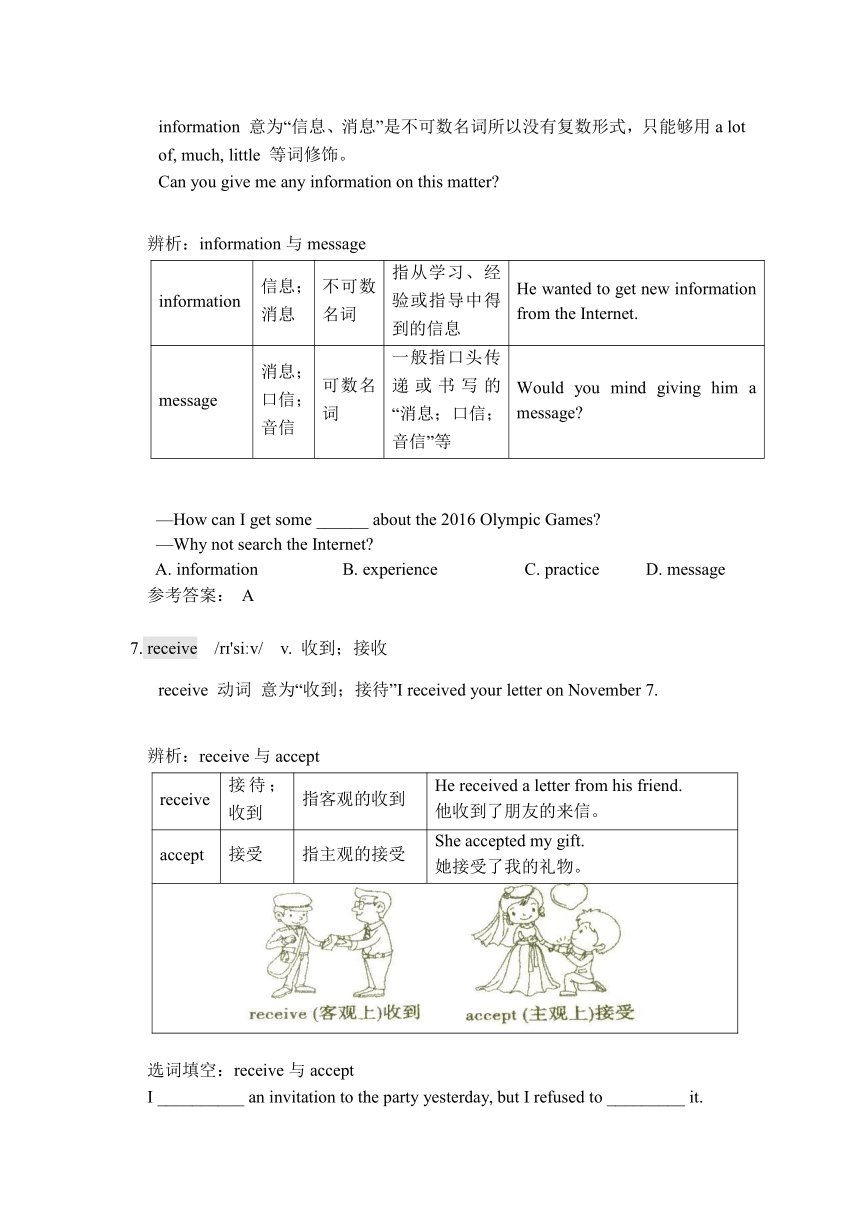
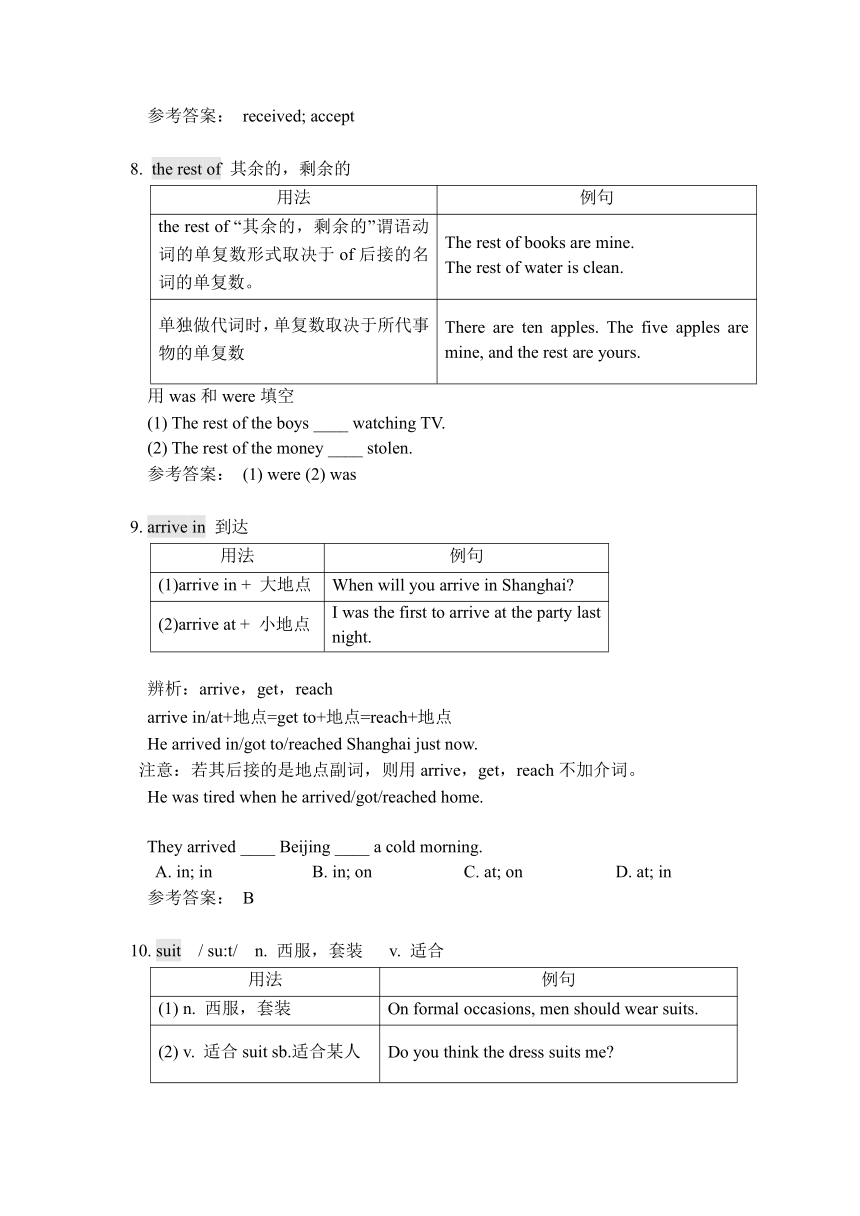
文档简介
Unit8 It must belong to Carla.
1. attend /??tend/ v. 出席;参加
用法
例句
attend意为“出席;参加”
I attended his lecture yesterday.
辨析:attend, join, take part in
attend
常用于参加会议、婚礼、葬礼、典礼,去上课、上学、听报告、出席音乐会、看演出、听演讲等
I attended his wedding.
join
指加入某个党派、团体、组织等,并成为其中的一员,如“参军、入团、入党”等
She joined the Young Pioneers.
take part in
指参加群众性活动等,并在其中发挥积极作用
We’ll take part in social practice during the summer vacation.
用attend, join, take part in填空
(1) When?did?your?brother?________ the?army?
(2) We?should?__________ school?activities.
(3) I _________ his?lecture yesterday.
参考答案: (1) join (2) take?a?part?in (3) attended?
2. belong to 属于
用法
例句
belong to不能用于进行时态,也不能用于被动语态。
The?islands belong?to?England.
belong to可与名词性物主代词或名词所有格进行句型转换。
This watch belongs to me.= This watch is mine.
(1) The book must . She’s the only one who’s studying French.
A. belong to Li Ying’s B. be Li Ying
C. belong Li Ying’s D. belong to Li Ying
(2) As is known to us all, China is a developing country ______ the third world.
A. belonging B. belonged
C. belonging to D. belonged to
参考答案: (1)D (2)C
3. valuable /?v?lju?bl/ adj. 有价值的;贵重的,宝贵的
用法
例句
valuable形容词意为“有价值的;贵重的,宝贵的 ”
His wife put on valuable ring and necklace.
value作为名词时意为“价值”;作为动词意为“重视;珍惜”
His work has no value.
I value the opinion of my husband and we agree on most things.
Peter’s father asked him to spend his time on something ______ researching into instead of playing all the time.
A. worthy B. valuable C. worth D. precious
参考答案:C
4. noise /n??z/ v. 噪音
用法
例句
noise名词意为“噪音”
There was too much noise in the room and he needed peace.
辨析:noise; sound与voice
noise
意为“噪音、喧闹声”,常指不悦耳、不和谐的嘈杂声
Please don’t make much noise in class.
sound
意为“声音”,泛指各种声音
Light travels much faster than sound.
voice
意为“嗓音”,一般指人的声音,如说话声、歌声、谈笑声等。
The boy has a beautiful voice.
用noise; sound与voice填空
(1)Don’t?speak?in?such?a?high?__________.
(2)Will?you?please?make?less?__________,?boys?and?girls?
(3)We?couldn’t?hear?a?_________?here.
参考答案: (1)voice (2)noise (3)sound
5. sleepy /'sli?p?/ adj. 困倦的;瞌睡的
用法
例句
sleepy形容词意为“困倦的;瞌睡的”,可以作表语或者定语
I was beginning to feel amazingly sleepy.
辨析:sleepy; asleep与sleep
sleepy
形容词
意为“困倦的;瞌睡的”可作表语或定语
feel sleepy “感到困倦”
He is so sleepy that he can’t listen carefully.
他太困了,以至于他不能认真听讲。
asleep
形容词
意为“睡着的”只能作表语
fall asleep“睡着”
The old man fell asleep while watching TV.
那位老人在看电视时睡着了。
sleep
动词
意为“睡觉”
sleep well “睡得好”
Please be quiet! The baby is sleeping.
请安静!那个婴儿在睡觉。
名词
意为“睡眠;睡觉”
go to sleep“入睡;睡着”
We need at least 8 hours’ sleep at night.
我们晚上至少需要8小时的睡眠。
(1) —Why are you looking _______ in class all day?
—Because I can’t finish my homework until eleven every night.
A. awake B. asleep C. sleeping D. sleepy
(2) 选词填空:sleepy; asleep与sleep
I often ________ for 8 hours every night.
My father fell ________ while he was reading a book.
The little boy couldn’t go on studying because he felt ________.
参考答案: (1)D (2)sleep; asleep; sleepy
6. information /?nf?'me??(?)n/ n. 信息;消息
information 意为“信息、消息”是不可数名词所以没有复数形式,只能够用a lot of, much, little 等词修饰。
Can you give me any information on this matter?
辨析:information与message
information
信息;消息
不可数名词
指从学习、经验或指导中得到的信息
He wanted to get new information from the Internet.
message
消息;口信;音信
可数名词
一般指口头传递或书写的“消息;口信;音信”等
Would you mind giving him a message?
—How can I get some ______ about the 2016 Olympic Games?
—Why not search the Internet?
A. information B. experience C. practice D. message
参考答案: A
7. receive /r?'si?v/ v. 收到;接收
receive 动词 意为“收到;接待”I received your letter on November 7.
辨析:receive与accept
receive
接待;收到
指客观的收到
He received a letter from his friend.
他收到了朋友的来信。
accept
接受
指主观的接受
She accepted my gift.
她接受了我的礼物。
选词填空:receive与accept
I __________ an invitation to the party yesterday, but I refused to _________ it.
参考答案: received; accept
the rest of 其余的,剩余的
用法
例句
the rest of “其余的,剩余的”谓语动词的单复数形式取决于of后接的名词的单复数。
The rest of books are mine.
The rest of water is clean.
单独做代词时,单复数取决于所代事物的单复数
There are ten apples. The five apples are mine, and the rest are yours.
用was和were填空
(1) The rest of the boys ____ watching TV.
(2) The rest of the money ____ stolen.
参考答案: (1) were (2) was
9. arrive in 到达
用法
例句
(1)arrive in + 大地点
When will you arrive in Shanghai?
(2)arrive at + 小地点
I was the first to arrive at the party last night.
辨析:arrive,get,reach
arrive in/at+地点=get to+地点=reach+地点
He arrived in/got to/reached Shanghai just now.
注意:若其后接的是地点副词,则用arrive,get,reach不加介词。
He was tired when he arrived/got/reached home.
They arrived ____ Beijing ____ a cold morning.
A. in; in B. in; on C. at; on D. at; in
参考答案: B
10. suit / su:t/ n. 西服,套装 v. 适合
用法
例句
(1) n. 西服,套装
On formal occasions, men should wear suits.
(2) v. 适合suit sb.适合某人
Do you think the dress suits me?
(1) 翻译:绿色适合你。
________________________________________________________________
(2) 翻译:我想买一套带有银色领带的黑色西服。
________________________________________________________________
参考答案: (1)Green suits you.
(2)I want to buy a black suit with a silver tie.
11. else /els/ adj./adv. 别的,其他的
用法
例句
(1) else用作形容词时常常用作后置定语,即:放在疑问代词who,what,which等后面,或者放在something,anything,nothing,anyone,everyone等不定代词之后
1) Who else can you see?
2)--What else do you want?
--Nothing else.
(1) Please don't go. I have ______ to tell you.
A. other something B. something other
C. else something D. something else
(2) I can see tigers ,pandas, monkeys and ______animals in the zoo.
A. other some B. some other
C. else some D. some else.
参考答案: DB
练习:
1. The bad weather can’t stop him to school on time.
A. go B.to go C.to going D. from going
2. It is silly _____ the piano in such low price.
A. of him to sell B. for him to sell C. of him selling D. for him to selling
3. Listening, speaking and reading are all important _____ writing.
A. but B. besides C. except D. expect
4. There are many kinds of bikes here. She can’t decide _____.
A. where to buy B. which to buy C. how to buy D. when to buy
5. ---Do you know these _____ over there? They're so handsome.
---Yes, they are my friends.
A. policemans B. Canadas C. postmans D. heroes
6. The Olympics _____ in China in 2008.
A. was taken place B. took place
C. was happened D. happened
7. ---Did you _____ the party last night?
---Yes, it was a good chance _____ some new friends.
A. attend; making B. join; making
C. attend; to make D. join; to make
8. ---Who is running on the sports field?
---It _____ be David, He is ill at home.
A. can't B. mustn't C. may not D. shouldn't
9. ---That man was often seen _____ money from shops.
---Oh, my god! I need to keep him _____ my store.
A. steal; away B. stole; from C. to steal, from D. stealing; away
10. Could you tell me _____?
A. what time is it
B. that if the earth goes around the sun
C. where he lives in
D. whether it will rain tomorrow
11. The book must _____. She’s the only one who’s studying French.
A. belong to Li Ying’s B. be Li Ying
C. belong Li Ying’s D. belong to Li Ying
12. ---Let's go to Yandu Park if it _______ tomorrow.
---But nobody knows if it_______ tomorrow.
A. won't rain; rains B. doesn't rain; rains
C. doesn't rain; will rain D. won't rain; will rain
13. I couldn’t see a dog or _____ , either.
A. anything else B. else anything
C. other anything D. anything other
14. Another two months will be needed before the new bridge ________.
A. completes B. is completed
C. has completed D. will be completed
15. It is _____ amazing news that everybody was shocked.
A. such an B. such a C. so D. such
16. The twins who _____ born in 2008 _____ suddenly. How sad their parents are!
A. were, are missing B. was, are missed
C. are, are lost D. were, are losing
17. The baby is always crying. He _____ be hungry.
A. can’t B. must C. should D. would
18. The train was late, _____ we had to wait for half an hour.
A. because B. or C.so D. but
19. Today, the forests have almost gone. People must _____ down too many trees.
A. stop to cut B. stop from cutting
C. be stopped to cut D. be stopped from cutting
20. —What happened ________ Jack yesterday?
—He lost his car.
A. for B. to C. with D. at
参考答案:DABBD BCACD DCABD ABCDB
二.语法精讲
情态动词表推测
情态动词可以表示说话的语气,本单元我们主要学了must,might,could can等情态动词表示推测的用法。
1. 情态动词表推测时,不同的形式表示不同的时态。
结构形式
用法
例句
情态动词+do
表示对现在情况的推测
She might be in the classroom now. 她现在可能在教室里。
情态动词+ be doing
表示对正在发生的事情的推测
It’s ten o’clock. He must be having class. 十点钟了,他一定在上课。
情态动词+have done
表示对过去或已完成的事情的推测
She is crying. She must have known the bad news. 她在哭,她一定已经知道了这个坏消息。
2. 情态动词表推测的意义和用法
句式
情态动词
用法
意义
例句
肯定句
must
表示有把握的肯定推测
一定;肯定
He must be very tired after a long journey. 长途旅行后,他一定很累。
could/ may/might
其肯定程度逐渐减弱,表示把握性不大的推测
可能
It might rain this afternoon. 今天下午可能会下雨。
否定句
can’t
表示有把握的否定推测
不可能
She can’t be at school. It’s Sunday today. 她不可能在学校里。今天是星期天。
疑问句
can/ could
表示推测
可能
Could Mike be an Indian boy?
迈克可能是一个印度男孩吗?
注:
1) could 用于否定句时,语气较can’t缓和,意为“不可能”。
He said the news couldn’t be true. 他说那个消息不可能是真的。
2) may/might 用于否定句时,表示不太有把握的否定推测,意为“可能不”。
This word might not mean “表扬”. 这个单词可能不是“表扬”的意思。
3) must用于否定句时,不表推测;mustn’t的意思是“禁止;一定不要”。
You mustn’t play soccer in the square. 你们一定不能在广场上踢足球。
练习:
1. You _____ (can/must) be tired after working for a long time without a rest.
2. —Who is the woman over there? Is she Mrs. Smith?
—It _____ (mustn’t/can't) be her. She is much taller.
3. —Where's Zhang Lei?
—I'm not sure. He _____ (could/need) be in the zoo.
4. —What will the weather be like tomorrow?
—It ______ (must/might) be windy or rainy. I'm not sure.
5. Alice ______ (must/can't) be working now, because the light in her room is still on.
参考答案:must; can’t; could; might; must
单选:
1.--Whose book is this?
--It be Lucy’s. Look, her name is on the cover.
A. can B. must C. may D. could
2. --It took me nearly forty minutes to walk here.
--Have a drink, please. You be thirsty.
A. will B. must C. should D. can
3. When you cross the road, you be very careful.
A. must B. should C. can D. may
4. I don’t know him. He a new comer.
A. must be B. may be C. can be D. maybe
5. Mary be in Paris. I saw her in town only a few minutes ago.
A. mustn’t B. shouldn’t C. can’t D. may not
6. Peter come with us tonight, but he isn’t very sure yet.
A. must B. may C. can D. will
7. I thought you like something to read, so I have brought you some books.
A. may B. might C. could D. must
8. --Are you going to Beijing by plane?
--It’s fast but expensive. So I am not sure. I ____ take a train.
A. should B. may C. must D. will
9. --Could I borrow your dictionary?
-- Of course you _____.
A. can B. must C. should D. will
10. John, you needn’t do your work today, you do it tomorrow if you’re tired.
A. must B. may C. can’t D. should
11. --Must I finish the work today?
--No, you ____. You can finish it tomorrow.
A. mustn’t B. can’t C. shouldn’t D. needn’t
12. --Do I have to come back tomorrow?
--Yes, you _____.
A. can B. may C. must D. should
13. --Listen! Helen is singing in the next room.
--It ____ be Helen. She has gone to Beijing.
A. must B. can’t C. might D. should
14. --Jill looks so painful, there ____ be something wrong with her.
--Oh dear! We’d better take her to the nearest hospital at once.
A. can B. should C. would D. must
15. --May I try on the jeans?
--Yes, you ____.
A. should B. can C. must D. need
16. --Is John coming by train?
-- He should, but he ____ not. He likes driving his car.
A. may B. can C. must D. need
17. --David, is that man your head teacher?
-- It ____ be him. He’s the tallest in our school.
A. mustn’t B. can’t C. needn’t D. won’t
18. Johnny, you ____ play with the knife, you _____ hurt yourself.
A. won’t; can’t B. mustn’t; may
C. shouldn’t; must D. can’t shouldn’t
19. All the lights are on; the Smiths _____ up.
A. must get B. are getting C. can’t get D. would get
20. --Isn’t that Ann’s husband over there?
--No, it ____ be him. I’m sure he doesn’t wear glasses.
A. can’t B. must not C. won’t D. may not
参考答案:BBABC BBBAB DCBDB ABBAA
1. attend /??tend/ v. 出席;参加
用法
例句
attend意为“出席;参加”
I attended his lecture yesterday.
辨析:attend, join, take part in
attend
常用于参加会议、婚礼、葬礼、典礼,去上课、上学、听报告、出席音乐会、看演出、听演讲等
I attended his wedding.
join
指加入某个党派、团体、组织等,并成为其中的一员,如“参军、入团、入党”等
She joined the Young Pioneers.
take part in
指参加群众性活动等,并在其中发挥积极作用
We’ll take part in social practice during the summer vacation.
用attend, join, take part in填空
(1) When?did?your?brother?________ the?army?
(2) We?should?__________ school?activities.
(3) I _________ his?lecture yesterday.
参考答案: (1) join (2) take?a?part?in (3) attended?
2. belong to 属于
用法
例句
belong to不能用于进行时态,也不能用于被动语态。
The?islands belong?to?England.
belong to可与名词性物主代词或名词所有格进行句型转换。
This watch belongs to me.= This watch is mine.
(1) The book must . She’s the only one who’s studying French.
A. belong to Li Ying’s B. be Li Ying
C. belong Li Ying’s D. belong to Li Ying
(2) As is known to us all, China is a developing country ______ the third world.
A. belonging B. belonged
C. belonging to D. belonged to
参考答案: (1)D (2)C
3. valuable /?v?lju?bl/ adj. 有价值的;贵重的,宝贵的
用法
例句
valuable形容词意为“有价值的;贵重的,宝贵的 ”
His wife put on valuable ring and necklace.
value作为名词时意为“价值”;作为动词意为“重视;珍惜”
His work has no value.
I value the opinion of my husband and we agree on most things.
Peter’s father asked him to spend his time on something ______ researching into instead of playing all the time.
A. worthy B. valuable C. worth D. precious
参考答案:C
4. noise /n??z/ v. 噪音
用法
例句
noise名词意为“噪音”
There was too much noise in the room and he needed peace.
辨析:noise; sound与voice
noise
意为“噪音、喧闹声”,常指不悦耳、不和谐的嘈杂声
Please don’t make much noise in class.
sound
意为“声音”,泛指各种声音
Light travels much faster than sound.
voice
意为“嗓音”,一般指人的声音,如说话声、歌声、谈笑声等。
The boy has a beautiful voice.
用noise; sound与voice填空
(1)Don’t?speak?in?such?a?high?__________.
(2)Will?you?please?make?less?__________,?boys?and?girls?
(3)We?couldn’t?hear?a?_________?here.
参考答案: (1)voice (2)noise (3)sound
5. sleepy /'sli?p?/ adj. 困倦的;瞌睡的
用法
例句
sleepy形容词意为“困倦的;瞌睡的”,可以作表语或者定语
I was beginning to feel amazingly sleepy.
辨析:sleepy; asleep与sleep
sleepy
形容词
意为“困倦的;瞌睡的”可作表语或定语
feel sleepy “感到困倦”
He is so sleepy that he can’t listen carefully.
他太困了,以至于他不能认真听讲。
asleep
形容词
意为“睡着的”只能作表语
fall asleep“睡着”
The old man fell asleep while watching TV.
那位老人在看电视时睡着了。
sleep
动词
意为“睡觉”
sleep well “睡得好”
Please be quiet! The baby is sleeping.
请安静!那个婴儿在睡觉。
名词
意为“睡眠;睡觉”
go to sleep“入睡;睡着”
We need at least 8 hours’ sleep at night.
我们晚上至少需要8小时的睡眠。
(1) —Why are you looking _______ in class all day?
—Because I can’t finish my homework until eleven every night.
A. awake B. asleep C. sleeping D. sleepy
(2) 选词填空:sleepy; asleep与sleep
I often ________ for 8 hours every night.
My father fell ________ while he was reading a book.
The little boy couldn’t go on studying because he felt ________.
参考答案: (1)D (2)sleep; asleep; sleepy
6. information /?nf?'me??(?)n/ n. 信息;消息
information 意为“信息、消息”是不可数名词所以没有复数形式,只能够用a lot of, much, little 等词修饰。
Can you give me any information on this matter?
辨析:information与message
information
信息;消息
不可数名词
指从学习、经验或指导中得到的信息
He wanted to get new information from the Internet.
message
消息;口信;音信
可数名词
一般指口头传递或书写的“消息;口信;音信”等
Would you mind giving him a message?
—How can I get some ______ about the 2016 Olympic Games?
—Why not search the Internet?
A. information B. experience C. practice D. message
参考答案: A
7. receive /r?'si?v/ v. 收到;接收
receive 动词 意为“收到;接待”I received your letter on November 7.
辨析:receive与accept
receive
接待;收到
指客观的收到
He received a letter from his friend.
他收到了朋友的来信。
accept
接受
指主观的接受
She accepted my gift.
她接受了我的礼物。
选词填空:receive与accept
I __________ an invitation to the party yesterday, but I refused to _________ it.
参考答案: received; accept
the rest of 其余的,剩余的
用法
例句
the rest of “其余的,剩余的”谓语动词的单复数形式取决于of后接的名词的单复数。
The rest of books are mine.
The rest of water is clean.
单独做代词时,单复数取决于所代事物的单复数
There are ten apples. The five apples are mine, and the rest are yours.
用was和were填空
(1) The rest of the boys ____ watching TV.
(2) The rest of the money ____ stolen.
参考答案: (1) were (2) was
9. arrive in 到达
用法
例句
(1)arrive in + 大地点
When will you arrive in Shanghai?
(2)arrive at + 小地点
I was the first to arrive at the party last night.
辨析:arrive,get,reach
arrive in/at+地点=get to+地点=reach+地点
He arrived in/got to/reached Shanghai just now.
注意:若其后接的是地点副词,则用arrive,get,reach不加介词。
He was tired when he arrived/got/reached home.
They arrived ____ Beijing ____ a cold morning.
A. in; in B. in; on C. at; on D. at; in
参考答案: B
10. suit / su:t/ n. 西服,套装 v. 适合
用法
例句
(1) n. 西服,套装
On formal occasions, men should wear suits.
(2) v. 适合suit sb.适合某人
Do you think the dress suits me?
(1) 翻译:绿色适合你。
________________________________________________________________
(2) 翻译:我想买一套带有银色领带的黑色西服。
________________________________________________________________
参考答案: (1)Green suits you.
(2)I want to buy a black suit with a silver tie.
11. else /els/ adj./adv. 别的,其他的
用法
例句
(1) else用作形容词时常常用作后置定语,即:放在疑问代词who,what,which等后面,或者放在something,anything,nothing,anyone,everyone等不定代词之后
1) Who else can you see?
2)--What else do you want?
--Nothing else.
(1) Please don't go. I have ______ to tell you.
A. other something B. something other
C. else something D. something else
(2) I can see tigers ,pandas, monkeys and ______animals in the zoo.
A. other some B. some other
C. else some D. some else.
参考答案: DB
练习:
1. The bad weather can’t stop him to school on time.
A. go B.to go C.to going D. from going
2. It is silly _____ the piano in such low price.
A. of him to sell B. for him to sell C. of him selling D. for him to selling
3. Listening, speaking and reading are all important _____ writing.
A. but B. besides C. except D. expect
4. There are many kinds of bikes here. She can’t decide _____.
A. where to buy B. which to buy C. how to buy D. when to buy
5. ---Do you know these _____ over there? They're so handsome.
---Yes, they are my friends.
A. policemans B. Canadas C. postmans D. heroes
6. The Olympics _____ in China in 2008.
A. was taken place B. took place
C. was happened D. happened
7. ---Did you _____ the party last night?
---Yes, it was a good chance _____ some new friends.
A. attend; making B. join; making
C. attend; to make D. join; to make
8. ---Who is running on the sports field?
---It _____ be David, He is ill at home.
A. can't B. mustn't C. may not D. shouldn't
9. ---That man was often seen _____ money from shops.
---Oh, my god! I need to keep him _____ my store.
A. steal; away B. stole; from C. to steal, from D. stealing; away
10. Could you tell me _____?
A. what time is it
B. that if the earth goes around the sun
C. where he lives in
D. whether it will rain tomorrow
11. The book must _____. She’s the only one who’s studying French.
A. belong to Li Ying’s B. be Li Ying
C. belong Li Ying’s D. belong to Li Ying
12. ---Let's go to Yandu Park if it _______ tomorrow.
---But nobody knows if it_______ tomorrow.
A. won't rain; rains B. doesn't rain; rains
C. doesn't rain; will rain D. won't rain; will rain
13. I couldn’t see a dog or _____ , either.
A. anything else B. else anything
C. other anything D. anything other
14. Another two months will be needed before the new bridge ________.
A. completes B. is completed
C. has completed D. will be completed
15. It is _____ amazing news that everybody was shocked.
A. such an B. such a C. so D. such
16. The twins who _____ born in 2008 _____ suddenly. How sad their parents are!
A. were, are missing B. was, are missed
C. are, are lost D. were, are losing
17. The baby is always crying. He _____ be hungry.
A. can’t B. must C. should D. would
18. The train was late, _____ we had to wait for half an hour.
A. because B. or C.so D. but
19. Today, the forests have almost gone. People must _____ down too many trees.
A. stop to cut B. stop from cutting
C. be stopped to cut D. be stopped from cutting
20. —What happened ________ Jack yesterday?
—He lost his car.
A. for B. to C. with D. at
参考答案:DABBD BCACD DCABD ABCDB
二.语法精讲
情态动词表推测
情态动词可以表示说话的语气,本单元我们主要学了must,might,could can等情态动词表示推测的用法。
1. 情态动词表推测时,不同的形式表示不同的时态。
结构形式
用法
例句
情态动词+do
表示对现在情况的推测
She might be in the classroom now. 她现在可能在教室里。
情态动词+ be doing
表示对正在发生的事情的推测
It’s ten o’clock. He must be having class. 十点钟了,他一定在上课。
情态动词+have done
表示对过去或已完成的事情的推测
She is crying. She must have known the bad news. 她在哭,她一定已经知道了这个坏消息。
2. 情态动词表推测的意义和用法
句式
情态动词
用法
意义
例句
肯定句
must
表示有把握的肯定推测
一定;肯定
He must be very tired after a long journey. 长途旅行后,他一定很累。
could/ may/might
其肯定程度逐渐减弱,表示把握性不大的推测
可能
It might rain this afternoon. 今天下午可能会下雨。
否定句
can’t
表示有把握的否定推测
不可能
She can’t be at school. It’s Sunday today. 她不可能在学校里。今天是星期天。
疑问句
can/ could
表示推测
可能
Could Mike be an Indian boy?
迈克可能是一个印度男孩吗?
注:
1) could 用于否定句时,语气较can’t缓和,意为“不可能”。
He said the news couldn’t be true. 他说那个消息不可能是真的。
2) may/might 用于否定句时,表示不太有把握的否定推测,意为“可能不”。
This word might not mean “表扬”. 这个单词可能不是“表扬”的意思。
3) must用于否定句时,不表推测;mustn’t的意思是“禁止;一定不要”。
You mustn’t play soccer in the square. 你们一定不能在广场上踢足球。
练习:
1. You _____ (can/must) be tired after working for a long time without a rest.
2. —Who is the woman over there? Is she Mrs. Smith?
—It _____ (mustn’t/can't) be her. She is much taller.
3. —Where's Zhang Lei?
—I'm not sure. He _____ (could/need) be in the zoo.
4. —What will the weather be like tomorrow?
—It ______ (must/might) be windy or rainy. I'm not sure.
5. Alice ______ (must/can't) be working now, because the light in her room is still on.
参考答案:must; can’t; could; might; must
单选:
1.--Whose book is this?
--It be Lucy’s. Look, her name is on the cover.
A. can B. must C. may D. could
2. --It took me nearly forty minutes to walk here.
--Have a drink, please. You be thirsty.
A. will B. must C. should D. can
3. When you cross the road, you be very careful.
A. must B. should C. can D. may
4. I don’t know him. He a new comer.
A. must be B. may be C. can be D. maybe
5. Mary be in Paris. I saw her in town only a few minutes ago.
A. mustn’t B. shouldn’t C. can’t D. may not
6. Peter come with us tonight, but he isn’t very sure yet.
A. must B. may C. can D. will
7. I thought you like something to read, so I have brought you some books.
A. may B. might C. could D. must
8. --Are you going to Beijing by plane?
--It’s fast but expensive. So I am not sure. I ____ take a train.
A. should B. may C. must D. will
9. --Could I borrow your dictionary?
-- Of course you _____.
A. can B. must C. should D. will
10. John, you needn’t do your work today, you do it tomorrow if you’re tired.
A. must B. may C. can’t D. should
11. --Must I finish the work today?
--No, you ____. You can finish it tomorrow.
A. mustn’t B. can’t C. shouldn’t D. needn’t
12. --Do I have to come back tomorrow?
--Yes, you _____.
A. can B. may C. must D. should
13. --Listen! Helen is singing in the next room.
--It ____ be Helen. She has gone to Beijing.
A. must B. can’t C. might D. should
14. --Jill looks so painful, there ____ be something wrong with her.
--Oh dear! We’d better take her to the nearest hospital at once.
A. can B. should C. would D. must
15. --May I try on the jeans?
--Yes, you ____.
A. should B. can C. must D. need
16. --Is John coming by train?
-- He should, but he ____ not. He likes driving his car.
A. may B. can C. must D. need
17. --David, is that man your head teacher?
-- It ____ be him. He’s the tallest in our school.
A. mustn’t B. can’t C. needn’t D. won’t
18. Johnny, you ____ play with the knife, you _____ hurt yourself.
A. won’t; can’t B. mustn’t; may
C. shouldn’t; must D. can’t shouldn’t
19. All the lights are on; the Smiths _____ up.
A. must get B. are getting C. can’t get D. would get
20. --Isn’t that Ann’s husband over there?
--No, it ____ be him. I’m sure he doesn’t wear glasses.
A. can’t B. must not C. won’t D. may not
参考答案:BBABC BBBAB DCBDB ABBAA
同课章节目录
- Unit 1 How can we become good learners.
- Section A
- Section B
- Unit 2 I think that mooncakes are delicious!
- Section A
- Section B
- Unit 3 Could you please tell me where the restroom
- Section A
- Section B
- Unit 4 I used to be afraid of the dark.
- Section A
- Section B
- Unit 5 What are the shirts made of?
- Section A
- Section B
- Review of Units 1-5
- Unit 6 When was it invented?
- Section A
- Section B
- Unit 7 Teenagers should be allowed to choose their
- Section A
- Section B
- Unit 8 It must belong to Carla.
- Section A
- Section B
- Unit 9 I like music that I can dance to.
- Section A
- Section B
- Unit 10 You're supposed to shake hands.
- Section A
- Section B
- Review of Units 6-10
- Unit 11 Sad movies make me cry.
- Section A
- Section B
- Unit 12 Life is full of the unexpected
- Section A
- Section B
- Unit 13 We're trying to save the earth!
- Section A
- Section B
- Unit 14 I remember meeting all of you in Grade 7.
- Section A
- Section B
- Review of Units 11-14
